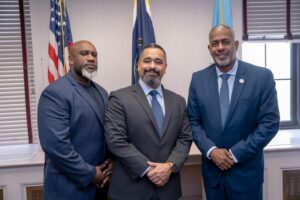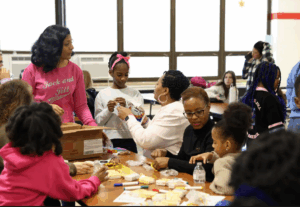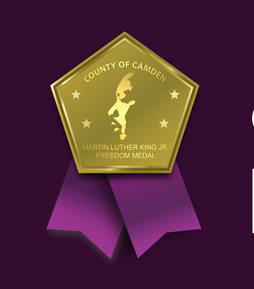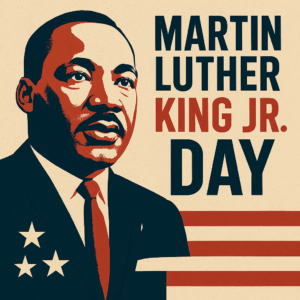Pressing Forward: Boycotts Work… Boycotts as Part of a Plan Work Better
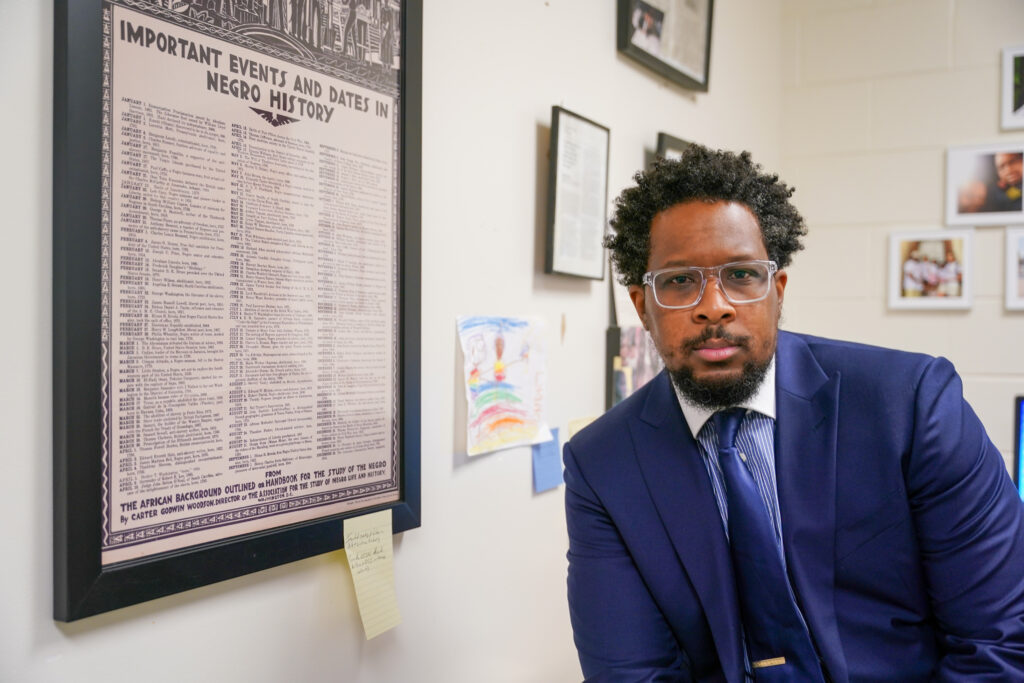
Rann Miller poses for a photograph in his office at Camden Promise Charter School in Camden, New Jersey, October 27, 2021. Miller is the head of Diversity, Equity and Inclusion for his Camden charter school district, and is reshaping curriculum to include important perspectives from the BIPOC community once left out.
BY RANN MILLER | For AC JosepH Media
As a result of Donald Trump’s anti-DEI executive orders, corporate retailers are under increased pressure to dismantle their DEI policies.
This was already happening before Trump’s election. Since his election, retailers including Target, Walmart, and Amazon have all abandoned DEI initiatives concerning their sales goals.
DEI stands for Diversity (meaning, acknowledging the ways people differ i.e. race, gender, age, socioeconomic status, religion, etc.), Equity (meaning, correcting societal imbalances by creating more opportunities for those who’ve historically had less access), and Inclusion (meaning, actively welcoming, supporting, respecting and valuing all individuals and groups in organizations).
Support for DEI initiatives gained traction after the murder of George Floyd and Breonna Taylor in 2020. The rollback of DEI began a few years after the initial rollout before the Trump Administration assumed power. Republican lawmakers and corporations purged themselves from policies and initiatives that supported DEI.
In response to retailer backlash, African Americans have sought to boycott these major retailers. An example is Atlanta pastor Jamal Bryant’s call for a 40-day fast from Target. 50,000 people have pledged to participate. Another is the NAACP’s call for Black people to steer their buying power toward companies that continue to embrace DEI initiatives.
The bad news for Pastor Bryant and others who push for a boycott. It likely won’t work…At least in its current iteration of being an emotion-driven endeavor. It’s not that a boycott is a bad idea because it’s not. Boycotts are an effective protest tool because they attack the profits of the boycotted entity. One of the most effective examples of a boycott (specifically in Black history) is the Montgomery Bus Boycott.
This was the boycott of the Montgomery Bus Company by the Black residents of Montgomery, AL (40,000 bus riders) who were subject to discriminatory policies by the bus company. The catalyst was the denial of Black bus riders to sit freely on buses and the subsequent arrest of Rosa Parks.
The 380-day boycott ended with Browder v. Gayle, declaring that state and local segregated bus laws were unconstitutional.
Certainly, some who think about a boycott have visions of Montgomery in their sights, but those visions of grandeur are nothing but a setup for disappointment if the lessons of that boycott aren’t learned. The people were organized, forming the Montgomery Improvement Association (MIA).
It took a court case for the discrimination to stop; the bus company was made to integrate its buses by court order, overriding Alabama’s Anti-Boycott Act of 1921. Had that not happened, the Black people of Montgomery were prepared to boycott the buses for as long as it took.
They were prepared to hold out because they were organized and unified. They were committed to carpooling. First, Black people used their own cars. Next came the MIA purchasing a fleet of station wagons to transport Black people.
The economic pain to the bus company wasn’t simply because Black folks boycotted. But because Black folks had a plan: they organized, made a demand, and had an alternative until their demand was met.
That’s how a boycott is effective. A one-day or forty-day boycott doesn’t work because you cannot put a timetable on resistance and a timetable placed on resistance undermines the effectiveness of any plan to obtain a concession.
El-Hajj Malik el-Shabazz, aka Malcolm X, once said that [Black people] aren’t outnumbered but out-organized. This explains why any calls for a boycott don’t work; we’re not organized. We’re fragmented and disoriented.
We’re competing with each other rather than collaborating. Multiple groups announce and “organize” their own boycott, likely only for a day, and effectively undermine their efforts.
Not only that, but we blame each other rather than understanding our varying entry points in discussions of protest and resistance. Consider that those who question the need or effectiveness of a boycott are justified in doing so. More than likely every corporation in existence has some tie to anti-Black racism through the years.
For example, maybe your insurance company, the university you attended, and who you bank with likely have ties to enslavement. Maybe, it isn’t enslavement the business has ties to. Maybe, they just racially discriminated against others, like Coca-Cola or Wells Fargo.
If we did a deep dive into the past of many of the consumer retailers, banks, insurance, mortgage, car companies, and whoever else we spend our dollars with, we may have to stop spending our dollars in most places.
The American corporation has anti-Black racism, enslavement, and genocide inside their DNA. Yet it’s hard to cease engaging with these due to capitalism’s stranglehold on us all.
Not only is our labor exploited but so is our consumption. Capitalism is why big corporations put mom-and-pop businesses out of business. Capitalism is why the hair care brand you thought was black-owned is white-owned. As a consumer, it’s hard to escape the racism of corporate retailers, especially when you lack the resources and access to divest.
Consumers also must work to consume for their survival and many people work at these companies. We must keep this in mind as we move forward to best craft a strategy that considers these factors… because if resistance is to be effective, it must consider the varying entry points of protest. We must also account for what it will take to no longer patronize these businesses and their products because capitalist racism leaves consumers dependent on corporations to sustain themselves.
…unless the people had an alternative.
If boycotting becomes the consensus, there must be a plan of action to guarantee success. Boycotting cannot be the plan itself but part of a comprehensive strategy. This is the lesson of the Montgomery Bus Boycott.
We must organize as a strategic bloc; nationally we must be on one accord and organized to act. This means our efforts across the country must collaborate, not compete. Secondly, we must have clear demands and objectives.
Third, we have a clear and accessible alternative(s) to the thing being boycotted. Lastly, we mustn’t put a timetable on the boycott; we must be prepared to boycott for as long as necessary — no matter the backlash.
Now is the time to see if we are our ancestor’s wildest dreams. They strategically and successfully resisted. At this moment, what will we do?
Bio: Rann Miller directs the 21st Century Community Learning Center, a federally funded after-school program located in southern New Jersey. He spent years teaching in charter schools in Camden, New Jersey. He is the creator, writer, and editor of the Official Urban Education Mixtape Blog. Follow him on Twitter: @UrbanEdDJ.
Follow Us Today On:
Note from AC JosepH Media: If you like this story and others posted on Front Runner New Jersey.com, lend us a hand so we can keep producing articles like these for New Jersey and the world to see. Click on SUPPORT FRNJ and make a contribution that will go directly in making more stories like this available. Thank you for reading!
